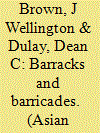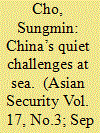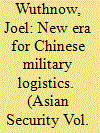|
|
|
Sort Order |
|
|
|
Items / Page
|
|
|
|
|
|
|
| Srl | Item |
| 1 |
ID:
182423


|
|
|
|
|
| Summary/Abstract |
This paper presents a theory of foreign military basing as a function of the degree of internal threat facing a host nation. The theory is based on rational choice logic where politicians balance economic and security benefits against sovereignty and legitimacy costs. When internal threat is low a host nation’s political actors value legitimacy and sovereignty and hence reduce base access. When internal threat is high economic and security benefits trump legitimacy and sovereignty costs, hence increasing base access. The theory is assessed through process-tracing the historical events around U.S military basing in the Philippines. When internal threat was low from coups and revolutionary movements the Philippine government reduced U.S. basing access, but when a threat from these movements was high they either maintained or increased access. This study suggests more carefully considering the role of internal threats when assessing the dynamics of foreign basing.
|
|
|
|
|
|
|
|
|
|
|
|
|
|
|
|
| 2 |
ID:
182418


|
|
|
|
|
| Summary/Abstract |
The Chinese military activities in the Yellow Sea have visibly increased. Compared to the South or East China Sea, however, China has not escalated tensions to the strategic level by employing paramilitary and nonmilitary tools of influence. The “regional hegemony” thesis can partially explain the increase of China’s military activities at the operational level. But it does not explain why China refrains from posing strategic challenges in the Yellow Sea in the way it does in the South and East China Seas. I argue that China’s defense advantages in the Yellow Sea and strategic interests in maintaining close ties with South Korea have motivated Beijing to avoid strategic crisis in the Yellow Sea. Simultaneously, however, the strategic competition with the United States has motivated China to accumulate its influence through military activities in the region. This article traces China’s military activities in the Yellow Sea and examines the Chinese discourses on this understudied region.
|
|
|
|
|
|
|
|
|
|
|
|
|
|
|
|
| 3 |
ID:
182422


|
|
|
|
|
| Summary/Abstract |
What is the role of colonial institutions in creating the conditions for nativist sons of the soil (SoS) insurgency? The literature on sons of the soil conflicts has not explored the historical legacies of colonial institutions, nor has it sufficiently analyzed how land tenure institutions create sons of the soil conflict. I address these gaps, by proposing a theory of how British colonial indirect rule and land tenure institutions in India caused exploitation of land resources of indigenous tribes by ethnic outsiders, which caused SoS grievances that persisted through path dependence and were later mobilized by Maoist rebels in the former princely state of Bastar in Central India. I show generalizability of this mechanism to other cases of leftist insurgency in Colombia, Mexico and Philippines.
|
|
|
|
|
|
|
|
|
|
|
|
|
|
|
|
| 4 |
ID:
182420


|
|
|
|
|
| Summary/Abstract |
I investigate reasons why Japan does not use “active-defense” cyber strategy for the purpose of cyberspace deterrence. I show that the reason has much to do with the passive nature of cyber strategy best characterized as “denial defense,” a strategic posture designed to deny attacks by defensive methods. I offer three reasons for this strategic choice. The first is the way the law works in Japan. The legal system, including the constitution, is the cornerstone of passive defense. All the reforms made in recent years to buttress Japan’s cyber policy have been within the existing legal framework. The second reason is the enormous technical constraints that Japan face on the use of cyber force. The final reason has much to do with the difficulty of sending credible threats to target audiences, reassuring the public , and controlling cyberspace escalation.
|
|
|
|
|
|
|
|
|
|
|
|
|
|
|
|
| 5 |
ID:
182421


|
|
|
|
|
| Summary/Abstract |
It has long been assumed that security communities form in the international system based on at least two criteria, having a strong collective identity and mutual trust among their members. Security is gleaned through mutual trust, while community coalesces around a strong collective identity and shared values. The Shanghai Cooperation Organization exhibits traits of a security community, where its structure is designed to institutionalize mutual trust, but the organization lacks a cohesive collective identity, especially since the inclusion of India and Pakistan into the organization, which has caused a weakening in the Russia-China driven identity within the intergovernmental organization. This paper examines how the SCO can function as a security community, arguing that a strong collective identity is only a sufficient condition for the establishment of a security community, mutual trust being the only ingredient necessary for a security community to form.
|
|
|
|
|
|
|
|
|
|
|
|
|
|
|
|
| 6 |
ID:
182417


|
|
|
|
|
| Summary/Abstract |
The PLA’s ability to project force within and beyond China’s borders, which Chinese strategists refer to as “strategic delivery,” depends on adequate logistics capabilities, systems, and policies. The new Joint Logistic Support Force will play a critical role in these respects. The force, established in 2016 as part of Xi Jinping’s reforms, made its operational debut in the PLA’s response to the novel coronavirus outbreak in Wuhan in 2020. That case provides details about the JLSF’s structure, capabilities, and operations. Leveraging insights from that case, the essay portrays the JLSF as a force in transition, both the inheritor of decades of investments in logistics modernization and recent upgrades, but also a new and largely untested force with several apparent weaknesses. Unless further improvements are made, the JLSF could be a weak link in future Chinese joint operations.
|
|
|
|
|
|
|
|
|
|
|
|
|
|
|
|
| 7 |
ID:
182419


|
|
|
|
|
| Summary/Abstract |
North Korea frequently uses diplomatic missions, diplomats and intelligence officers in its Weapons of Mass Destruction (WMD) proliferation and arms trafficking networks. The paper places the use of these assets in historical context, provides a basic typology of their role, and considers why they have featured in North Korea’s networks. The paper identifies a number of trends surrounding the use of North Korean missions – including the types and locations of missions featuring in specific types of proliferation and arms dealing activities, the prominence of larger missions and use of third country and regional hubs. It argues that the persistence of these assets in the DPRK’s networks is largely a result of convenience and diplomatic immunity. The paper concludes by recommending further action to counter these assets while arguing that the phenomenon will continue to be a challenging feature of North Korea’s proliferation and arms trading activities.
|
|
|
|
|
|
|
|
|
|
|
|
|
|
|
|
|
|
|
|
|